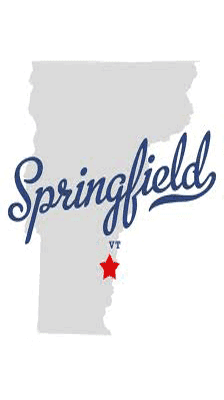The U.S. Department of Agriculture temporarily suspended operations several times for inhumane treatment of animals at a slaughterhouse in North Springfield over the past six months. The managing partner of the business said Thursday he has taken steps to address the problem.
www.burlingtonfreepress.com


VT slaughterhouse responds to USDA suspensions
Dan D'Ambrosio , Free Press Staff Writer 5:09 p.m. ET May 4, 2017
0:34
0:43
Time traveling on Church Street
Time traveling on Church Street
CLOSE
Historic postcards from the Champlain College Special Collections show the history of Burlington's focal point.DENNIS REDMOND/FREE PRESS
VTpackinghouseRM.JPGBuy Photo
(Photo: RYAN MERCER/FREE PRESS)
15
CONNECT
TWEET
LINKEDIN
1
COMMENT
EMAIL
MORE
The U.S. Department of Agriculture temporarily suspended operations several times for inhumane treatment of animals at a slaughterhouse in North Springfield over the past six months. The managing partner of the business said Thursday he has taken steps to address the problem.
"We're in good standing with the USDA," Arion Thibourmery said Thursday. "We do take the actual instances (of inhuman treatment) seriously."
The USDA confirmed that Vermont Packinghouse is currently open and operating. The agency said its inspectors will continue to monitor the slaughterhouse to make sure it is operating within statutory and regulatory requirements.
Vermont Packinghouse issued a statement on Thursday, saying, "Despite 3 cattle mis-stuns in the last 6 months that resulted in the USDA temporarily suspending slaughter, Vermont Packinghouse remains committed to humane handling and public transparency. We admit these deficiencies openly and have made substantive changes to do better."
The USDA also temporarily suspended operations at Vermont Packinghouse in October for two botched slaughters of "large white market swine." In a notice of suspension dated Oct. 12, 2016, the USDA described a situation in which its inspector saw a plant supervisor attempting to shoot a large sow in the head with a shotgun to render it unconscious before slaughter.
Sides of bacon at Vermont Packinghouse before slicing.
Sides of bacon at Vermont Packinghouse before slicing. (Photo: COURTESY)
"The animal was ineffectively stunned as evidenced by loud vocalization and it remained ambulatory," the notice states. "The swine managed to escape out of the stun box and proceeded to travel onto the kill floor."
After about 10 minutes, employees at the slaughterhouse were able to get the sow back into the stun box, where it was successfully stunned with the shotgun, rendering it unconscious.
The USDA reported that the same thing happened to another sow about three hours later, but that in this instance a manager was able to immediately reload and properly stun the sow.
Thiboumery said in an email that the issue with the sows was "totally unrelated" to the three beef "mis-stuns."
"We did some large sows as a favor for someone, this issue happened, and now we no longer process large sows," Thiboumery said.
Sen. Patrick Leahy (D-VT) talks with Sonny Perdue,
Sen. Patrick Leahy (D-VT) talks with Sonny Perdue, President Trump's nominee to lead the Agriculture Department, before the start of Perdue's confirmation hearing before the Senate Committee on Agriculture, Nutrition, and Forestry on Capitol Hill, March 23, 2017 in Washington. (Photo: Drew Angerer, Getty Images)
In its statement regarding the cattle, Vermont Packinghouse said the "mis-stuns" were unacceptable and "go against our company values." On its website, the company quotes farmer-philosopher Wendell Berry, who refers to the slaughter of animals as a "sacrament" that must be done "knowingly, lovingly, skillfully, reverently."
"While each instance was different, the key issue was stopping cattle movement during stunning," the statement continues. "We have improved our cattle stunning process with a state-of-the-art hydraulic restraint to make the chances of a mis-stun far less likely."
The hydraulic restraint was a "substantial investment" for a small business, the statement says, but the right thing to do for humane handling of animals and employee safety.
Vermont Packinghouse has a staff of 50 and works with more than 300 local farms.
Kristin Haas, state veterinarian and director of the Vermont Agency of Agriculture's food safety program, said Thursday there is a great need for slaughterhouses in the state to support a "very robust localvore movement."
"They certainly have the customer base, but there are standards everybody has to adhere to," Haas said. "Our expectation is that things are done humanely and according to the law."
Vermont has one of the strongest humane treatment laws in the country governing slaughterhouses. The law includes penalties of $1,000 per instance of inhumane treatment up to a total of $25,000. It also requires federally inspected slaughterhouses such as Vermont Packinghouse to notify the state agriculture agency of any federal actions taken against them.
Haas said Vermont Packinghouse reported the suspensions imposed by the USDA as required. She said the state agency decided against financial penalties because the company addressed the problems cited by the USDA. A state inspector visited the plant about two weeks ago to confirm that equipment used in the stunning process had been upgraded.
"I would say that I personally gained a nice level of confidence after having our compliance and enforcement officer go there," Haas said Thursday. "I trust his judgment. He's very experienced at what he does."





I have brought a few animals there and I have to say I'm very impressed on how well they treated my pigs.
ReplyDeleteArion is only in it for the money!
ReplyDelete